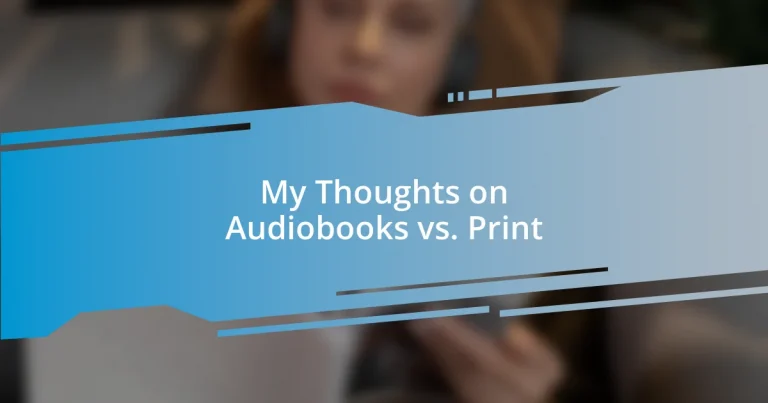Key takeaways:
- Audiobooks offer convenience for multitasking and can enhance comprehension through skilled narration, making literature more accessible, especially for those with vision impairments.
- Print books provide a tactile, immersive experience that fosters focus, deeper engagement, and better retention of information through interactive reading practices like highlighting and note-taking.
- Each format meets different situational needs: print books are ideal for deep, reflective reading, while audiobooks are advantageous during commutes or while performing other tasks.
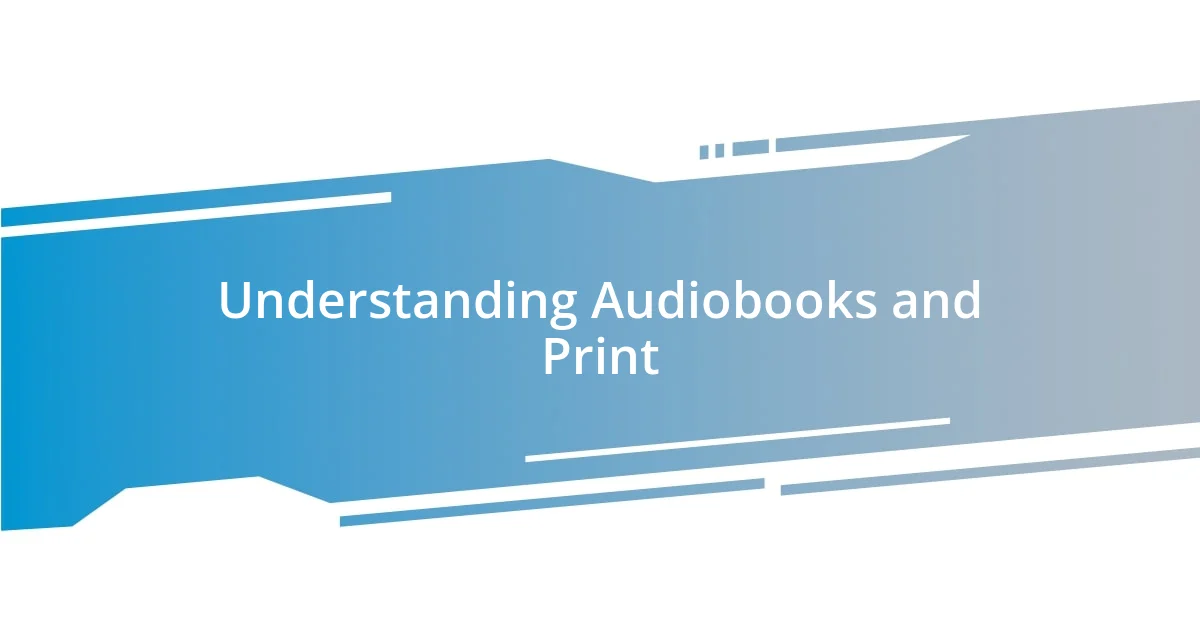
Understanding Audiobooks and Print
When I first delved into the world of audiobooks, I was taken aback by how immersive they can be. It’s almost like having a storyteller right there with you, weaving tales into your day. Have you ever found yourself glued to the sound of a narrator’s voice, feeling the characters leap off the page—or in this case, the audio—right into your imagination?
On the other hand, holding a print book is a sensory delight. The smell of the pages and the feel of the cover can transport you to another time, a ritual I cherish. I remember curling up with a well-loved paperback, the kind with dog-eared pages, as I lost track of time. There’s something undeniably comforting about the tactile experience of reading—a rhythm to turning each page that has a certain nostalgia, wouldn’t you agree?
Both mediums, in their own way, evoke different emotional responses and learning styles. Personally, I find audiobooks great for multitasking, like when cleaning the house or jogging. Yet, while I embrace the convenience of listening, there’s a special kind of focus that comes with reading print. It makes me wonder: in our fast-paced lives, which method truly allows us to absorb the stories in a deeper way?
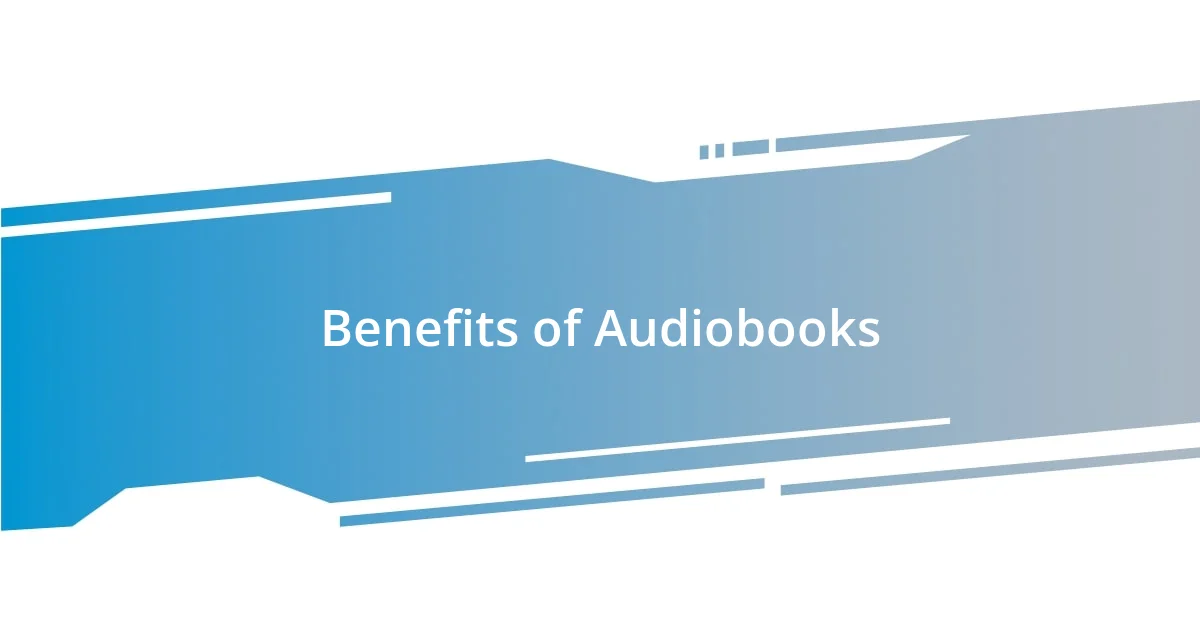
Benefits of Audiobooks
Audiobooks offer a unique convenience that I often find invaluable in my busy life. Imagine being able to dive into a novel while you’re cooking dinner or commuting. It transforms those otherwise mundane moments into opportunities for storytelling, helping me feel more connected to the narrative. I fondly recall listening to an engaging thriller during my morning walks, and I was so captivated that I actually walked extra laps just to find out what happened next!
Not only do audiobooks allow for this multitasking bliss, but they can also enhance comprehension and retention in some cases. Hearing a story can create a more vivid picture in your mind, especially when skilled narrators employ different voices for characters. There’s something magical about how they can bring emotions and nuances to life. The first time I experienced this was with a beloved fantasy series; the narrator’s performance made the fantastical elements feel all the more real, leaving me in awe at how much depth an audiobook could have.
Accessibility is another standout benefit of audiobooks. For those with vision impairments or reading difficulties, audiobooks provide a way to enjoy literature that might otherwise be out of reach. I remember a friend sharing how audiobooks opened up a new world for her, allowing her to experience her favorite authors once again. It’s stories like hers that really underscore the importance of this medium in making literature inclusive for all.
| Benefit | Description |
|---|---|
| Convenience | Listen while multitasking, perfect for busy lifestyles. |
| Enhanced Comprehension | Narrators add emotional depth, improving retention and enjoyment. |
| Accessibility | Makes literature available for those with vision or reading challenges. |
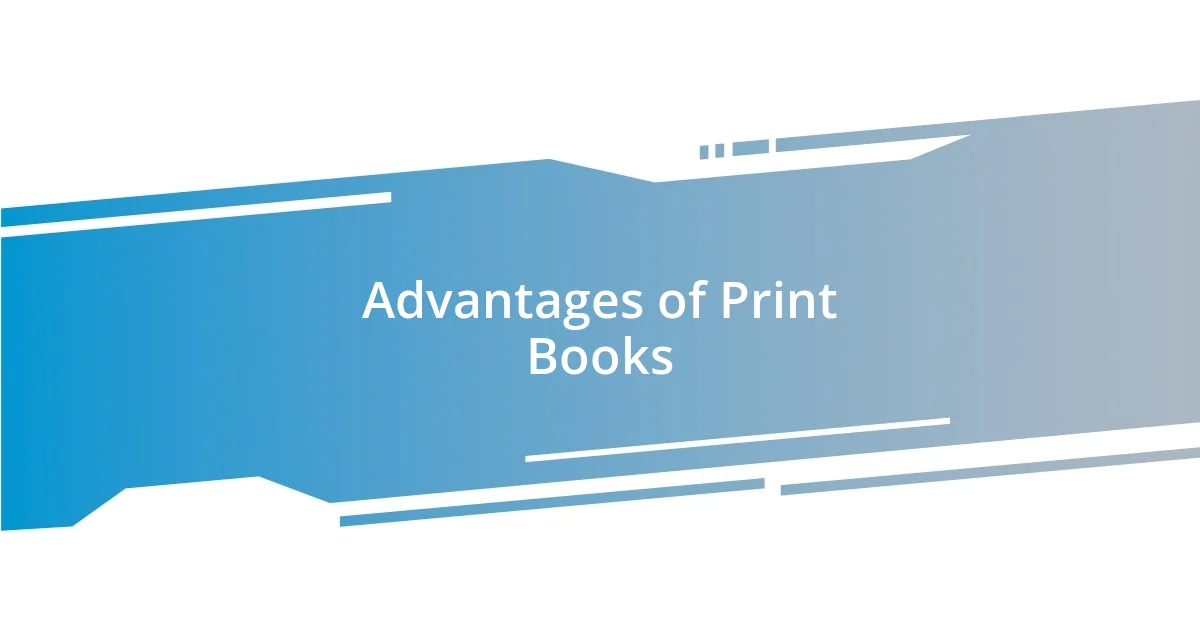
Advantages of Print Books
The charm of print books lies in their physical presence. I’ve often found that there’s something almost magical about the act of flipping through pages. I remember being wrapped up in a hardcover novel during a rainstorm, the sound of the raindrops outside harmonizing with the quiet rustle of the pages as I turned them. It created a world that felt tactile and immersive, pulling me into the narrative in a way that’s often difficult to replicate digitally or audibly.
Some distinct advantages of print books include:
- Tactile Experience: The feel of the paper and the weight of the book enhances the reading experience.
- Focus and Concentration: Print reading requires less distraction, allowing for deeper engagement with the material.
- Better Comprehension: Studies suggest that readers often comprehend and retain information better when reading from a page.
- Personalization: You can easily bookmark pages, highlight passages, and write notes in the margins, creating a unique connection with your book.
- Aesthetic Appeal: Print books can be beautiful objects to display, adding character to any space.
Every time I open a print book, I’m reminded of the unique relationship I’ve built with my favorites—each crease and coffee ring tells a story. When holding a book, I feel more inclined to linger in a passage, savoring the language and getting lost in my thoughts. This tactile interaction with a physical book can sometimes lead to a richer exploration of ideas, intricacies I might rush through in other formats.
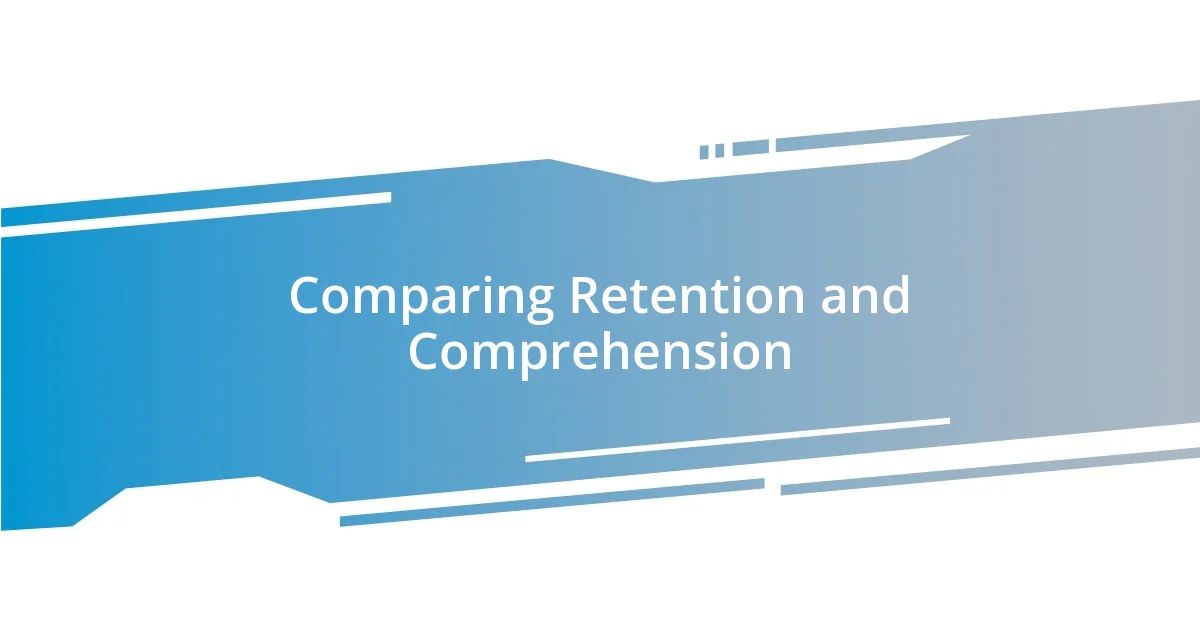
Comparing Retention and Comprehension
When it comes to comparing retention and comprehension between audiobooks and print, the differences can be truly fascinating. I remember a time when I listened to a non-fiction audiobook during a road trip. Initially, I thought the convenience would mean I’d absorb the material effortlessly. However, when I later tried to recall some of the key concepts for a discussion, I struggled. It made me realize that while the auditory experience can be engaging, it sometimes lacks the immediate visual cues that print provides, which can anchor information more effectively in our memory.
On the flip side, I once read a print book that completely absorbed me. I recall sitting on my patio, completely engrossed in the text. The way I could highlight passages and jot down my thoughts in the margins made it feel like a personal dialogue with the author. This interactivity not only helped reinforce my understanding of the material but also created a lasting bond with the content. Isn’t it amazing how physically engaging with a book can enhance recall?
Then there’s the matter of distraction in both formats. With audiobooks, I often find myself zoning out when my mind wanders, especially during long stretches of driving. In contrast, with print, I can see where I am in the narrative and focus my attention more easily. I’ve learned that the act of reading a printed page seems to require a more intentional approach, thus fostering a deeper comprehension. Have you noticed how those little habits affect your own retention? For me, shifting between formats has taught me valuable lessons about how I learn and remember.
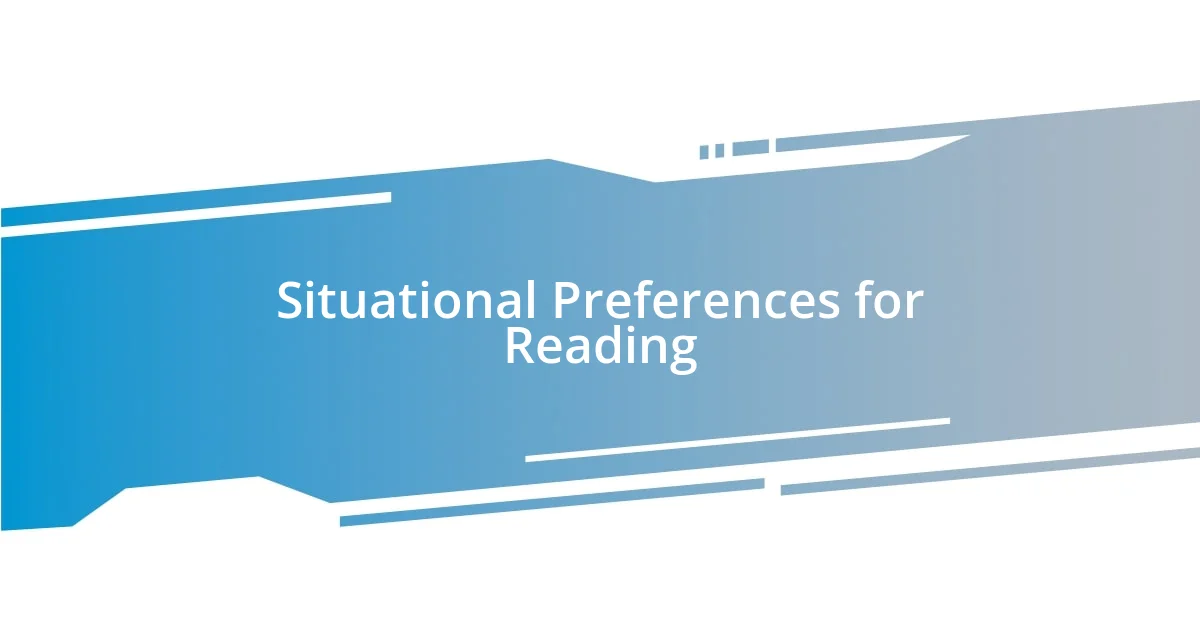
Situational Preferences for Reading
There are certain moments when only a print book will do. For instance, I recall a chilly evening after a hectic workday. Wrapped in a blanket, I found solace in diving into a paperback, feeling the weight of the book settle comfortably in my lap. That tactile experience was grounding, allowing me to escape into another world, taking me far away from the day’s stresses. It’s moments like these that remind me how being physically present with a book can amplify the experience.
Conversely, I notice that audiobooks serve a unique purpose in my life during my daily commute. While stuck in traffic, I often switch on an audiobook, letting the narrator’s voice guide me through tales and ideas while navigating the jam. It transforms what could be a frustrating time into an enriching experience. I’ve even found myself arriving at work feeling inspired and energized, but is that because of the format or the content? The dual nature of these situations highlights how each format meets different needs in my life.
There are also times when I crave the instant access that my e-reader provides. I remember a lazy weekend where I suddenly felt like revisiting a classic. With just a few taps, I had the book at my fingertips, ready for a delightful read. It made me appreciate how technology enhances convenience, especially in situations where carrying a stack of print books isn’t practical. Does that ease of access outweigh the romance of traditional reading for you? For me, finding a balance between these formats allows me to appreciate the beauty and utility of both.












